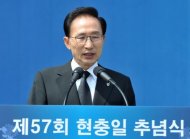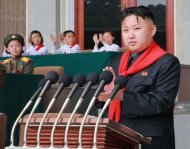 |
| Hope it's not loaded? |
Seasons in the Kingdom

Wednesday, June 27, 2012
North Executed 4 Defectors from China.
 | |
| 자료사진: 북한 주민이 공개재판장으로 끌려가고 있다. (중앙포토) |
The four were among a group of 44 North Koreans who fled to China to avoid political oppression and chronic food shortages in the North, according to Kim Heung-kwang, the head of The North Korean Intellectuals Solidarity, a Seoul-based defectors’ group.
Kim said the 40 others were sent to political prison camps after being repatriated from China. He said he obtained such information from an unidentified source inside North Korea, though he did not elaborate on the details of the 44 defectors.
China views North Korean defectors as “economic migrants,” and not refugees, and typically sends them back to their communist homeland where they can face harsh punishment. The latest claim of the North’s public executions could not be independently verified, as the isolated country strictly restricts outside access.
Kim made the claim in a seminar on a bill designed to help improve North Korea’s dismal human rights record. A ruling Saenuri Party lawmaker recently submitted the bill to the National Assembly, which also called for South Korea to send humanitarian aid to North Koreans.
The bill faced strong opposition from opposition lawmakers, however, who questioned its effectiveness.
North Korea has long been accused of human rights abuses, ranging from holding hundreds of thousands of political prisoners to torture and public executions.
Yonhap
Tuesday, June 26, 2012
New Photos
Wayne Golden's additions
Go to this link to see the images originally taken as slides in 1962. DMZ area and Camp Kaiser.
This was Unchon-Ni in circa 1962, where all the bars were. In recent times it was renamed Unchon City. There were 56 bars there and maybe 2000 bar girls, lots of slicky boys too. Girls worked for mama san and slicky boys stole from Camp Kaiser and sold what they got. 8th. Army wire dump was the biggest theft items to steal. Sometimes they were killed by our armed guards who were immediately given a free trip back to the states. Prostitutes came thru the wire into the hooches to work at night. $2 short time G.I. ?? Can do! All night in the vil was $5.
 |
Go to this link to see the images originally taken as slides in 1962. DMZ area and Camp Kaiser.
This was Unchon-Ni in circa 1962, where all the bars were. In recent times it was renamed Unchon City. There were 56 bars there and maybe 2000 bar girls, lots of slicky boys too. Girls worked for mama san and slicky boys stole from Camp Kaiser and sold what they got. 8th. Army wire dump was the biggest theft items to steal. Sometimes they were killed by our armed guards who were immediately given a free trip back to the states. Prostitutes came thru the wire into the hooches to work at night. $2 short time G.I. ?? Can do! All night in the vil was $5.
Wednesday, June 20, 2012
Sinchon Village Street Scene
Tuesday, June 19, 2012
New Pictures, 18th MP, Camp Kaiser, Korea
Fixing password issue... try this link to go to these photo pages. Any problems please let me know.
1961-62 Korea in the vicinity of Camp Kaiser, which included a village with over 50 clubs. These photos were donated for viewing by Wayne Golden.
Korean Service Veteran Photos
1961-62 Korea in the vicinity of Camp Kaiser, which included a village with over 50 clubs. These photos were donated for viewing by Wayne Golden.
Korean Service Veteran Photos
Friday, June 15, 2012
NEW post - pictures of Ascom City, early 1960s
Go to Photo & Stories page for the link for pictures of Ascom City with new link for Duplantis and more pictures under Gompers...or go directly to the link,
Korean Service Veteran Photos
best to you, Tim
Korean Service Veteran Photos
best to you, Tim
Wednesday, June 13, 2012
China, the Yalu & North Korea
Yonhap news....Chinese military conducts river-crossing drill in apparent defense against N.K. refugees
DANDONG,
China, June 13 (Yonhap) -- More than 100 Chinese soldiers took part in
a river-crossing exercise on its Yalu River border with North Korea
Tuesday, renewing speculation the Chinese military is preparing to
defend against any influx of North Korean refugees following possible
regime collapse in Pyongyang.Uniformed soldiers wearing orange life vests could be seen building and rebuilding about a dozen pontoon bridges at various points along the Yalu River, which separates China and North Korea. Each bridge stretched 20 to 30 meters, made up of six or seven sections connected to each other.
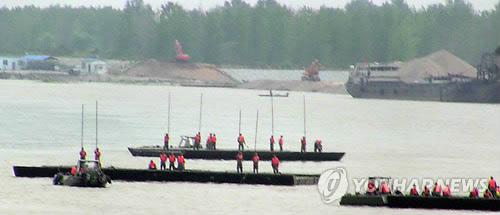 |
That section of the river that separates the Chinese city of Dandong and the North Korean city of Sinuiju is only 400 to 500 meters wide.
Chinese troops have been observed during similar exercises in the past, with Japanese media outlets reporting one such in July 2004. The Chinese state-run media denied such exercises had taken place, and the Beijing government remained silent.
Media reports have claimed the drills are to prepare China for regime collapse in Pyongyang, which it fears will spark a massive influx of North Korean refugees across their shared border. The reports claimed Chinese troops could cross into North Korea in such an event to stem the flow of refugees.
Dandong residents told Yonhap News Agency the exercises take place on a regular basis and usually in the summer.
"The drill today started in the morning, but I have seen Chinese troops conduct similar exercises on the Yalu River about two or three more times in previous years," said one resident, who spoke on condition of anonymity.
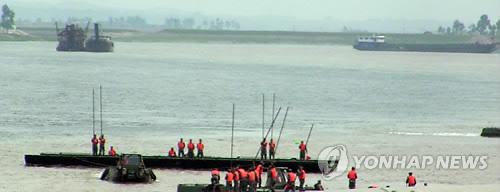 |
As the exercises took place, not much activity could be detected from the other side of the river in Sinuiju, aside from a few North Korean cargo ships anchored at a dock.
Dandong is an economic and political hot spot in relations between China and North Korea, as it serves as the biggest hub for bilateral trade and a major destination for North Korean defectors seeking to resettle in South Korea.
China is North Korea's last remaining major ally and the two countries are bound by a treaty that pledges military support in the event of a war on either side.
Monday, June 11, 2012
S. Korea accuses N. Korea of 'crossing the line'
South Korea accused North Korea Friday of "crossing the line" with its recent threats and insults, and pressed the impoverished country to start repayments for past food aid. The unification ministry, in charge of cross-border affairs, said the North should immediately halt threats and slander against the South's conservative President Lee Myung-Bak. "Such threats are crossing the line the two Koreas must keep in their relations," said spokesman Kim Hyung-Suk.
The North has for months heaped insults on Lee and other conservative leaders, terming them "rats" and "human scum". It threatened "sacred war" against the South in retaliation for perceived insults during Pyongyang's April commemoration of the centenary of the birth of founding leader Kim Il-Sung. On Monday Pyongyang's military threatened rocket attacks on the Seoul offices of seven media outlets in revenge for their critical coverage of a mass children's event north of the border this week.
It listed the coordinates of some of the offices and said missile units and other forces had already targeted the buildings.
"We once again demand gravely that North Korea immediately stop such provocative acts," the ministry spokesman said. He also urged Pyongyang to start paying for food aid shipped by Seoul between 2000 and 2007, saying the first payment of principal and interest worth $5.83 million was due on June 7. "The position of our government is that loans for food aid... must be repaid as agreed, and we demand North Korea keep the agreement sincerely," the spokesman said. He said Seoul could take further steps if Pyongyang fails to pay up but did not elaborate.
Seoul sent a notice through its Export-Import Bank in May giving advance notification of the date for the first payment. It sent a second notice on Friday. Under the previous left-leaning government, the South provided the North with some 2.6 million tonnes of food worth $720 million in six instalments between 2000 and 2007. Repayments for the food were to be made in the form of a long-term cheap loan, while fertiliser worth a total of 799.5 billion won ($683 million) was given free from 2000 to 2007. The South also lent the North equipment and material worth $140 million for railways and roads, and another $88 million for developing light industry and natural resources. The food and fertiliser aid ended after President Lee took office in early 2008 and rolled back the "sunshine" policy of aid and engagement with the North.
Friday, June 8, 2012
Marmot Hole - Post on Prostitution
Go here for full article and comments

If anyone is interested there is a presentation Saturday about US military prostitution in Korea. I have no idea how this is going to be presented, but I would not be surprised if it turns into a bash the US military type of presentation where they blame prostitution in Korea on the US military. Hopefully it will not. So I wonder if Professor Lee is going to have a presentation in the future about prostitution in Korea in general or outside of ROK military bases?

If anyone is interested there is a presentation Saturday about US military prostitution in Korea. I have no idea how this is going to be presented, but I would not be surprised if it turns into a bash the US military type of presentation where they blame prostitution in Korea on the US military. Hopefully it will not. So I wonder if Professor Lee is going to have a presentation in the future about prostitution in Korea in general or outside of ROK military bases?
Wednesday, June 6, 2012
Horror of North Korea's Prison Camps
Horror of North Korea’s Prison Camps Revealed by Escapee
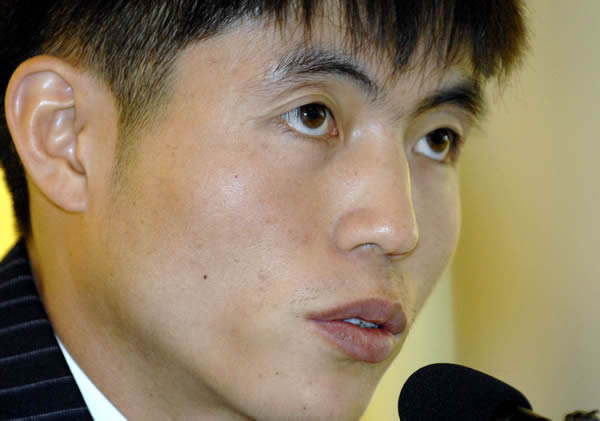
Shin
Dong-hyuk, a North Korean defector, speaks during a press conference in
Seoul, in October 2007.
Shin who was born and spent 22 years in a North Korean prison camp. Deep inside the darkness of North Korea—a totalitarian state from which little news escapes—as many as 200,000 citizens are suffering in the regime’s forced labor camps, living each day with no hope and no expectation of a better life ahead. One man, however, has escaped to tell his life story, helping to shed some light on this horrifying abyss of death.
Shin who was born and spent 22 years in a North Korean prison camp. Deep inside the darkness of North Korea—a totalitarian state from which little news escapes—as many as 200,000 citizens are suffering in the regime’s forced labor camps, living each day with no hope and no expectation of a better life ahead. One man, however, has escaped to tell his life story, helping to shed some light on this horrifying abyss of death.
Harden reports that according to the South Korean government, 154,000 prisoners reside in these camps, though the U.S. State Department pegs the number at closer to 200,000. The biggest of them is reportedly 31 miles long and 25 miles wide—bigger than Los Angeles—and electrified barbed-wire fences surround the perimeter. To date, the camps have lasted twice as long as the Soviet Gulag and 12 times longer than Nazi concentration camps. Yet little is known of them in the outside world.
Shin’s life began in a total vacuum of hope and humanity. All he had to look forward to was hard labor, a near-starvation diet, beatings, and an early death. For Shin, this was the only life he knew; he possessed little knowledge of his own country, let alone the wider world. Tragically, as Harden reveals, Shin didn’t even understand the concept of love—not even from his own mother, whom he viewed as competitor for food, whom he betrayed to the authorities when he learned of her plans to escape, and whose execution he witnessed firsthand. Harden writes of the stark existence:
Love and mercy and family were words without meaning. God did not disappear or die. Shin had never heard of him. . . In Camp 14, Shin did not know literature existed. He saw only one book in the camp, a Korean grammar, in the hands of a teacher who wore a guard’s uniform, carried a revolver on his hip, and beat one of his primary school classmates to death with a chalkboard pointer.And for Shin, it was his home, and he gave no thought to a life different from his own. But that was until he encountered two other prisoners who were newcomers to the camp—outsiders who brought news of a better life. With one of those prisoners, Shin plotted an escape, leading to his nearly aimless flight into China, South Korea, and ultimately the United States.
Unlike those who have survived a concentration camp, Shin had not been torn away from civilized existence and forced to descend into hell. He was born and raised there. He accepted its values. He called it home.
Today, Shin has devoted his life to educating the world about the prison camps. In a recent interview, he described how he decided to risk his life for a chance at escape. “My feeling at that time, even if I were to get shot and die, was that I would want to experience even just for one day of that freedom.”
Read more about North Korea today in Uncertainties over North Korea’s Leadership Transition: Broader Contingency Planning Is Essential for Regional Stability, a paper by Heritage’s Bruce Klingner.
Interactive Map with Prison Camps from the Washington Post
Prison Camps - Korea from Yonhap News
SEOUL, June 1 (Yonhap) -- South
Korea plans to increase diplomatic pressure on North Korea over human
rights issues, including the case of three people from the South
believed to have been held in the communist nation for decades, a senior
official said Friday.
The move could further exacerbate the already frayed relations between Seoul and Pyongyang.
An immediate focus of the campaign is expected to be on the case of Shin Suk-ja and her two daughters who are believed to have been held in the North since 1987, a year after her husband, Oh Kil-nam, fled the communist nation.

Oh claims his family was lured to the North in 1985 via West Germany where he was studying.
But a senior North Korean diplomat told a U.N. group last month that Shin had died of hepatitis and the two daughters do not regard Oh as their father since "he abandoned his family and drove their mother to death."
"The situation is that we can no longer turn a blind eye to human rights problems in North Korea, including the case of Ms. Shin, political prison camps" and others, a senior presidential official said. "The government will mobilize all diplomatic channels possible for this."
Earlier this week, South Korean President Lee Myung-bak called for greater international attention to the Shin case as he met with Sweden's King Carl XVI Gustaf. Sweden's deputy foreign minister, who was present at the meeting, promised to cooperate actively with Seoul's efforts.
"Though it is difficult to have direct talks with North Korea, we're trying to have contact with various channels," such as the U.N. General Assembly, the Human Rights Council, the European Union, Sweden and other nations that can talk to Pyongyang, the official said.
North Korea has long been labeled one of the worst human rights violators in the world. The regime does not tolerate dissent, holds hundreds of thousands of people in political prison camps and keeps a tight control over outside information.
But Pyongyang has long bristled at any talk of its human rights records, denouncing it as part of U.S.-led attempts to topple the regime.
Relations between the two Koreas worsened seriously after President Lee took office in early 2008 as North Korea protested strongly to his policy of linking aid to progress in international efforts to end Pyongyang's nuclear weapons programs.
The ties plunged further after the North's two deadly attacks on the South in 2010.
jschang@yna.co.kr
(END)
The move could further exacerbate the already frayed relations between Seoul and Pyongyang.
An immediate focus of the campaign is expected to be on the case of Shin Suk-ja and her two daughters who are believed to have been held in the North since 1987, a year after her husband, Oh Kil-nam, fled the communist nation.

Oh claims his family was lured to the North in 1985 via West Germany where he was studying.
But a senior North Korean diplomat told a U.N. group last month that Shin had died of hepatitis and the two daughters do not regard Oh as their father since "he abandoned his family and drove their mother to death."
"The situation is that we can no longer turn a blind eye to human rights problems in North Korea, including the case of Ms. Shin, political prison camps" and others, a senior presidential official said. "The government will mobilize all diplomatic channels possible for this."
Earlier this week, South Korean President Lee Myung-bak called for greater international attention to the Shin case as he met with Sweden's King Carl XVI Gustaf. Sweden's deputy foreign minister, who was present at the meeting, promised to cooperate actively with Seoul's efforts.
"Though it is difficult to have direct talks with North Korea, we're trying to have contact with various channels," such as the U.N. General Assembly, the Human Rights Council, the European Union, Sweden and other nations that can talk to Pyongyang, the official said.
North Korea has long been labeled one of the worst human rights violators in the world. The regime does not tolerate dissent, holds hundreds of thousands of people in political prison camps and keeps a tight control over outside information.
But Pyongyang has long bristled at any talk of its human rights records, denouncing it as part of U.S.-led attempts to topple the regime.
Relations between the two Koreas worsened seriously after President Lee took office in early 2008 as North Korea protested strongly to his policy of linking aid to progress in international efforts to end Pyongyang's nuclear weapons programs.
The ties plunged further after the North's two deadly attacks on the South in 2010.
jschang@yna.co.kr
(END)
Tuesday, June 5, 2012
Goseong and back...ROK 2008
The bus ride to Goseong and Back.
Our bus driver to Goseong was very engaging.
It was not long before we struck up a conversation. Wanting to know where we
were from, I at first attempted to place our origin to a major city in the US.
He was very glad that we were from the USA and taking the time to enjoy the
beauty of his homeland's mountains and coast, which he pointed out in his limited English.
When I said we were from the Boston area, he didn't recognize that city, but
knowing that Koreans are also great baseball fans, I mentioned the Red Sox, and
on that we had common ground. He was awed and shook his head in
affirmation.
He stopped at a fresh water spring for a drink, and would have had a smoke if I wanted one. Then we stopped along the roadside and he jumped off and gathered up some sour cherries from some folks sitting there eating them. His friends, as he is the local driver on this route. The entire trip we traveled with the door open, through which he threw the pits from the cherries and to let in some air. He was also very happy that I had brought my daughter, and their picture together is a fond family memory of this day, and one of those moments during the trip that was special for the person we had met and one that was special for us.
The ride back was good, although the walk from the site to the bus stop was a crueling uphill trudge. We picked up the bus where our friend had indicated and at the time indicated. The bus was mostly empty except for the driver - a woman, the bus driver's young daughter, an older woman seated in the front seat, and an additional passenger picked up a few miles down the road, another young woman about 18-20 years old. The older woman in the front seat was chattering away with the bus driver most of the way. I can't remember when we started to talk, but I think it was when I recognized something she was saying and responded, to her great amusement. She was laughing and carrying on, and every once in a while I'd throw in a Korean word to make her think I was getting everything she was saying to me and to the driver.
She tried out her English, talking to the driver, "I luvaa u, soorry, goodbye," all the time laughing.
An elder woman, she was in good spirits and when I responded in Korean, she and the driver were howling with laughter.
"I luvaa u, soorry, goodbye," she continued repeatedly almost all the way back to the bus station in Goseong, amusing the bus driver and embarrassing the young woman seated a few rows behind me. It was her only English I am sure, or we might have heard something else.
The wheres and whens of her English education were many years removed. When we were at the bus terminal to change buses for the ride back to Jinju, we parted.
He stopped at a fresh water spring for a drink, and would have had a smoke if I wanted one. Then we stopped along the roadside and he jumped off and gathered up some sour cherries from some folks sitting there eating them. His friends, as he is the local driver on this route. The entire trip we traveled with the door open, through which he threw the pits from the cherries and to let in some air. He was also very happy that I had brought my daughter, and their picture together is a fond family memory of this day, and one of those moments during the trip that was special for the person we had met and one that was special for us.
The ride back was good, although the walk from the site to the bus stop was a crueling uphill trudge. We picked up the bus where our friend had indicated and at the time indicated. The bus was mostly empty except for the driver - a woman, the bus driver's young daughter, an older woman seated in the front seat, and an additional passenger picked up a few miles down the road, another young woman about 18-20 years old. The older woman in the front seat was chattering away with the bus driver most of the way. I can't remember when we started to talk, but I think it was when I recognized something she was saying and responded, to her great amusement. She was laughing and carrying on, and every once in a while I'd throw in a Korean word to make her think I was getting everything she was saying to me and to the driver.
She tried out her English, talking to the driver, "I luvaa u, soorry, goodbye," all the time laughing.
An elder woman, she was in good spirits and when I responded in Korean, she and the driver were howling with laughter.
"I luvaa u, soorry, goodbye," she continued repeatedly almost all the way back to the bus station in Goseong, amusing the bus driver and embarrassing the young woman seated a few rows behind me. It was her only English I am sure, or we might have heard something else.
The wheres and whens of her English education were many years removed. When we were at the bus terminal to change buses for the ride back to Jinju, we parted.
Subscribe to:
Comments (Atom)


 기사단어
기사단어 dictionary
dictionary






